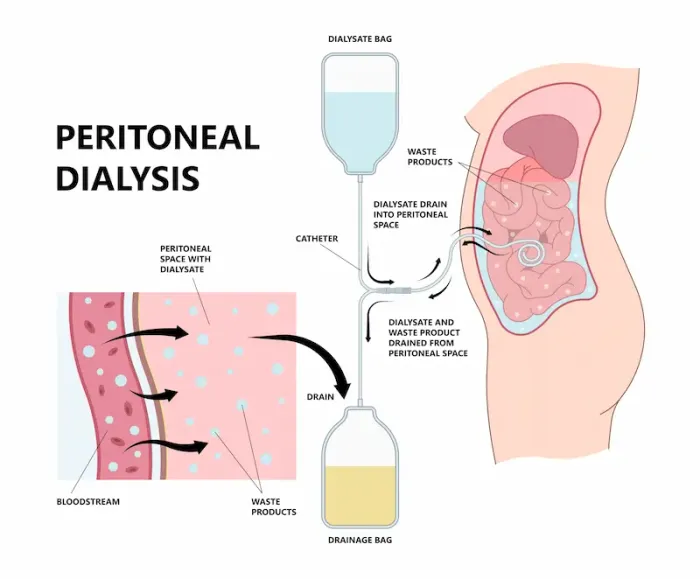Peritoneal Disorders Overview and Treatment
Learn about peritoneal disorders, their causes, symptoms, and diagnostic methods. Explore treatment options and management approaches for maintaining abdominal and overall health.

Written by Dr. J T Hema Pratima
Reviewed by Dr. D Bhanu Prakash MBBS, AFIH, Advanced certificate in critical care medicine, Fellowship in critical care medicine
Last updated on 13th Jan, 2026

The peritoneum is a thin, protective membrane that lines the abdominal cavity and covers organs like the stomach, liver, and intestines. When this membrane becomes inflamed or infected, it can lead to peritoneal disorders, which may cause discomfort and serious health issues if left untreated.
If you or a loved one is experiencing abdominal pain or other concerning symptoms, this guide will help you understand peritoneal disorders, their causes, and available treatments.
What Are Peritoneal Disorders?
Peritoneal disorders are conditions that affect the peritoneum, leading to inflammation, infection, or fluid buildup. Some common peritoneal disorders include:
1. Peritonitis – Inflammation of the peritoneum, often caused by infection.
2. Ascites – Abnormal fluid accumulation in the abdomen.
3. Peritoneal Cancer – A rare cancer affecting the peritoneum.
4. Peritoneal Dialysis-Related Infections – Infections in patients undergoing dialysis.
Consult a Top Gastroenterologist
Symptoms of Peritoneal Disorders
The symptoms vary depending on the specific disorder but may include:
• Severe abdominal pain (worsens with movement)
• Bloating or swelling in the abdomen
• Fever and chills (indicating infection)
• Nausea and vomiting
• Loss of appetite
• Fatigue and weakness
• Difficulty breathing (due to fluid pressing on the diaphragm)
If you notice these symptoms, especially sudden severe pain, seek medical attention immediately, as some conditions (like peritonitis) can be life-threatening.
What Causes Peritoneal Disorders?
Different conditions affect the peritoneum in various ways:
1. Infections – Bacterial or fungal infections (common in peritonitis).
2. Liver Disease – Cirrhosis can cause fluid buildup (ascites).
3. Kidney Failure – Patients on peritoneal dialysis may develop infections.
4. Abdominal Injuries or Surgeries – Can introduce bacteria into the peritoneum.
5. Cancer – Ovarian, stomach, or colon cancer may spread to the peritoneum.
How Are Peritoneal Disorders Diagnosed?
Doctors use several tests to diagnose peritoneal disorders:
• Physical Examination – Checking for tenderness, swelling, or fluid buildup.
• Blood Tests – To detect infections or organ dysfunction.
• Imaging Tests – Ultrasound, CT scan, or MRI to visualize abnormalities.
• Paracentesis – Removing fluid from the abdomen for analysis.
• Biopsy – If cancer is suspected, a tissue sample may be taken.
Early diagnosis is crucial for effective treatment, so don’t ignore persistent symptoms.
Get Your Health Assessed
Treatment Options for Peritoneal Disorders
Treatment depends on the underlying cause:
1. Peritonitis Treatment
• Antibiotics – To fight bacterial infections.
• Surgery – If caused by a ruptured appendix or bowel perforation.
• Drainage – Removing infected fluid.
2. Managing Ascites (Fluid Buildup)
• Diuretics – Medications to reduce fluid retention.
• Paracentesis – Draining excess fluid.
• Diet Changes – Reducing salt intake to prevent fluid retention.
3. Peritoneal Cancer Treatment
• Chemotherapy – Directly into the abdomen (intraperitoneal chemo).
• Surgery – Removing cancerous tissue.
• Targeted Therapy – For advanced cases.
4. Preventing Dialysis-Related Infections
• Strict Hygiene – Proper cleaning of catheter sites.
• Regular Check-ups – Monitoring for early signs of infection.
Lifestyle and Dietary Tips for Managing Peritoneal Disorders
While medical treatment is essential, certain lifestyle changes can help manage symptoms:
• Eat a Balanced Diet – Focus on lean proteins, whole grains, and fresh vegetables.
• Limit Salt Intake – Excess salt worsens fluid retention (ascites).
• Stay Hydrated – Drink enough water unless advised otherwise by your doctor.
• Avoid Alcohol – Especially if liver disease is a contributing factor.
• Exercise Moderately – Gentle activities like walking can improve circulation.
• Follow Medical Advice – Take prescribed medications on time and attend follow-ups.
When to See a Doctor?
Seek immediate medical help if you experience:
• Sudden, severe abdominal pain
• High fever with chills
• Persistent vomiting or inability to eat
• Rapid swelling of the abdomen
Early intervention can prevent complications and improve recovery.
Need Expert Help? Consult a Specialist Today
If you suspect a peritoneal disorder or have ongoing abdominal discomfort, don’t wait. Apollo 24|7 offers expert consultations and diagnostic tests to help you get the right treatment.
Final Thoughts
Peritoneal disorders can range from mild to severe, but with timely diagnosis and proper treatment, many conditions can be managed effectively. Pay attention to your body’s signals, follow medical advice, and adopt healthy habits to support recovery.
Consult a Top Gastroenterologist
Consult a Top Gastroenterologist

Dr Bhargav Vuppumalla
General Physician/ Internal Medicine Specialist
5 Years • MBBS MD GENERAL MEDICINE
Bengaluru
Apollo Medical Center, Marathahalli, Bengaluru

Dr. Shivaraj Afzalpurkar
Gastroenterology/gi Medicine Specialist
13 Years • MBBS, MD General medicine (Gold medalist), DrNB (Gastroenterology), MNAMS
Bengaluru
Apollo Clinic, JP nagar, Bengaluru

Dr Rohit Sureka
Gastroenterology/gi Medicine Specialist
15 Years • MBBS, DNB General Medicine, DNB Gastroenterology
Jaipur
Apollo 247 virtual - Rajasthan, Jaipur

Dr. Seshadri Venkatesh P
Gastroenterology/gi Medicine Specialist
27 Years • DNB(Gen. Med.), DNB(Gastro)
Chennai
Apollo Hospitals Greams Road, Chennai
(50+ Patients)

Dr. Amit Pandita
Gastroenterology/gi Medicine Specialist
10 Years • MBBS. MD (INTERNAL MEDICINE) DrNB (GASTROENTEROLOGY AND HEPATOLOGY)
Delhi
Apollo Hospitals Indraprastha, Delhi
Consult a Top Gastroenterologist

Dr Bhargav Vuppumalla
General Physician/ Internal Medicine Specialist
5 Years • MBBS MD GENERAL MEDICINE
Bengaluru
Apollo Medical Center, Marathahalli, Bengaluru

Dr. Shivaraj Afzalpurkar
Gastroenterology/gi Medicine Specialist
13 Years • MBBS, MD General medicine (Gold medalist), DrNB (Gastroenterology), MNAMS
Bengaluru
Apollo Clinic, JP nagar, Bengaluru

Dr Rohit Sureka
Gastroenterology/gi Medicine Specialist
15 Years • MBBS, DNB General Medicine, DNB Gastroenterology
Jaipur
Apollo 247 virtual - Rajasthan, Jaipur

Dr. Seshadri Venkatesh P
Gastroenterology/gi Medicine Specialist
27 Years • DNB(Gen. Med.), DNB(Gastro)
Chennai
Apollo Hospitals Greams Road, Chennai
(50+ Patients)

Dr. Amit Pandita
Gastroenterology/gi Medicine Specialist
10 Years • MBBS. MD (INTERNAL MEDICINE) DrNB (GASTROENTEROLOGY AND HEPATOLOGY)
Delhi
Apollo Hospitals Indraprastha, Delhi
